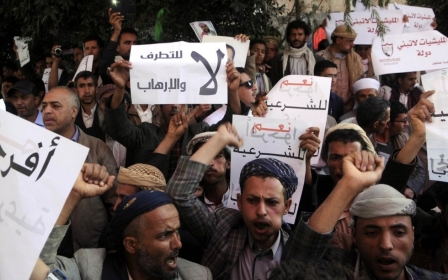Houthis lift house arrest of prime minister

Resigned Yemeni Prime Minister Khaled Bahah said on Monday that the Shiite Houthi movement had lifted the two-months-long house arrest imposed on him and other cabinet members in the capital Sanaa.
In a statement on his Facebook page, Bahah said the house arrest imposed on him and several cabinet members since 19 January was lifted “thanks to efforts from Ansar Allah [Houthi] leaders, UN envoy to Yemen Jamal Benomar, political powers and civil society organisations.”
The move, he said, entails “full freedom of movement inside and outside the country … and comes as a gesture of goodwill” to ease talks on Yemen’s political transition.
He also said that his government, which tendered its resignation en masse on 22 January, had no intention of assuming caretaker duties “due to the country’s exceptional circumstances.” He insisted that he had no intention of resuming his post.
The resigned government, he said, would “open room for political powers to shoulder their national responsibilities and reach an agreement” on ending the country’s political crisis.
Bahah also declared that he was preparing to leave Sanaa to visit his family in the southern province of Hadhramaut, describing his time under house arrest for 57 days as “a unique experience.”
Yemen has remained in a state of chaos since September, when the Houthis took over the capital Sanaa, from which they have sought to extend their control to other parts of the country. Yemen’s main benefactor, Saudi Arabia, suspended aid soon after the takeover.
On 21 February, President Abd Rabbuh Mansour Hadi fled Sanaa - where he, too, had been placed under house arrest by the Houthis for weeks - to Aden.
Upon his arrival in the southern city, Hadi dismissed as “null” and “illegitimate” all recently issued Houthi decrees, and set up a rival administration that is backed by the Gulf countries. He also wrote to Yemen’s parliament, withdrawing a resignation he had tendered earlier.
Last month, the Houthis issued what they described as a constitutional declaration dissolving parliament and establishing a 551-member transitional council.
The declaration, however, was rejected by most of Yemen’s political forces - along with some neighbouring Gulf countries -which described it as a “coup against constitutional legitimacy.”
On Sunday, Houthi leader Abdel Malek al-Houthi said that his group was engaged in indirect talks with Yemen’s neighbour Saudi Arabia. This is the first known dialogue to take place between the Shiite militia and the regional powerhouse since the Houthis’ takeover in September.
New MEE newsletter: Jerusalem Dispatch
Sign up to get the latest insights and analysis on Israel-Palestine, alongside Turkey Unpacked and other MEE newsletters
Middle East Eye delivers independent and unrivalled coverage and analysis of the Middle East, North Africa and beyond. To learn more about republishing this content and the associated fees, please fill out this form. More about MEE can be found here.



